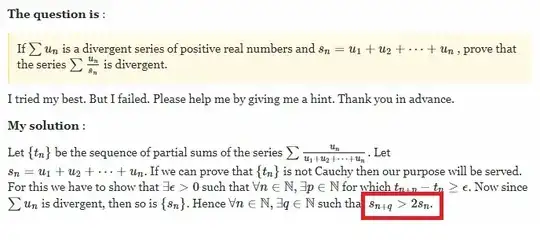If $u_n>0$ and $\sum u_n$ diverges and $s_n=u_1+u_2+\dots+u_n$ then is the claim that "we can choose $p\in \mathbb{N}$ such that $s_{n+p}>2s_n$" is justified?
I know the following
$\sum u_n$ diverges iff sequence of partial sum $\{s_n\}$ diverges
sequence $\{s_n\}$ is monotone increasing
But how to show that $s_{n+p}>2s_n$ is justified?
In the link Is my proof ok? If $\sum u_n$ diverges then $\sum \frac {u_n} {u_1 + u_2 + \dots + u_n}$ also diverges
Only want to get the result $s_{n+p}>2s_n$. Please help
